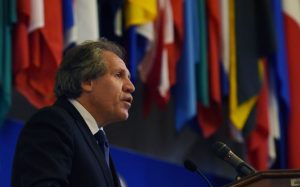Democracy and Human Rights Are Above Petty Politics, and Almagro Is Fighting the Hardest for Them

. (La Prensa)
In the document, which he sent to the representatives from all countries before the meeting of a “Permanent Council,” Amalgro said that, “in defense of democracy we must avoid double standards and apply all mechanisms, like the Inter-American Democratic Charter, in all cases where essential elements of democracy are deteriorating.” He also emphasized the importance of both democracy and human rights being above politics, because if lost, all of society feels that pain.
The Secretary General said the OAS is the driving force behind new ways of defending democracy on the continent. It proposes a commitment to a multilateral defense of basic democratic values and principles, as well as an ethical commitment to identifying dysfunction within the system, and to, “ask questions, objectively, when our rights are violated.” He stressed that international defense of democracy is everyone’s responsibility.
To justify convening the Permanent Council, he said that since 2002, in various opportunities the members of the OAS often discussed how “support was far from infringing on the principle of non-intervention when compared with that of regional solidarity.” With these interests in mind, “the procedure should attend to the changes to the constitutional order,” as they affect the democratic order and the Bolivarian Republic of Venezuela.
Specifically, the OAS is denouncing the institutional crisis, the deterioration of the humanitarian situation, the brutal corruption happening everyday and “gross violations” of freedom of press and expression. As a result, the organization claims the best solution is a collective aimed at “promoting the normalization of democratic institutionally” of the nation.
But Amalgro’s behavior as Chancellor of Uruguay under President José Mujica between 2010 and 2015 did not allow us to clearly foresee his willingness to carry out an unrestricted defense of democracy.
Copying his mentors Fidel Castro y Hugo Chávez, Maduro tried to intimidate Amalgro with public insults and profanity. He called him trash, a traitor and a CIA agent, claiming that Amalgro can stick the democratic charter up his you-know-what.
That strategy, which had gotten such quality results for his predecesor, did not affect Almagro. On the contrary, the more insults Maduro dished out, the more firm Almagro seemed in his resolve.
On the other hand, his stance left false feelings among presidents of the region that for some years felt shameful about Venezuela but never acted. In retrospect, their excuses come across as dubious at best.
The story that the legitimacy of Chávez and Maduro resides in the fact that they were appointed via popular election is only swallowed by their supporters and the most ignorant of people. In a democracy, elections are an essential but not sufficient sign of healthy government. For starters, only a well-informed citizen base is able to choose freely, something Chávez actively prevented.
Additionally, if the entire population depends on the state for their livelihood, it is naive to think that that actually equates to true voting autonomy. If we add to this implicit and explicit threats, media censorship and so many other things, then we have to ask: what is the real source of legitimacy? And that goes without mentioning that Maduro virtually resorted to fraud in the 2013 elections.
But, even more important than the origin of this legitimacy is the legitimacy of the army. It’s important to abide by the separation of powers, the autonomy of the various organizations that have different responsibilities both civilly, economically and politically. Essentially: being transparent that power is limited.
Some presidents and former presidents, to avoid condemning chavism — toward which they feel an undeniable admiration — say they believe in the “principles of non-intervention” regarding internal affairs of their country.
One example is Mujica. A good friend to Chávez, the former Uruguyan President said “they have to fix things in Venezuela themselves. They don’t need outsiders trying to help.” He stressed the point that the current situation in Venezuela must be resolved between themselves and there should be no outside help, “much less from outside the continent.”
But the attitude of Almagro has laid bare such cowardice, hypocrisy and inauthenticity.
No comments:
Post a Comment